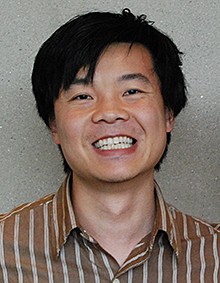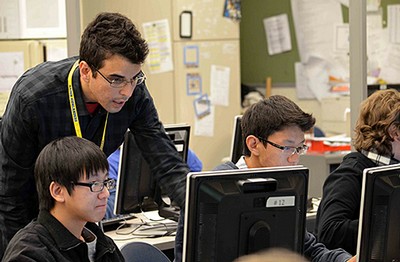Laying the CS pipeline
About 18 months ago, Kevin Wang (B.S.’02 EECS) sold his Porsche and was ready to quit his software development job at Microsoft. He had a side project that was gaining momentum, so he was going to use the Porsche money to work on it full time.

Kevin Wang (Photo by Kevin Wang/TEALS)
When Microsoft heard about his plans they called him into a meeting. Rather than fire him, they asked if he wanted to stay on as an employee, but work solely on his new project.
“It’s like a start-up nonprofit getting incubated within Microsoft,” Wang says. “I don’t have to think about infrastructure or fundraise. I just have to focus on the important thing: getting computer science classes into schools and getting kids interested in computer science.”
Wang’s project is called Technology Education and Literacy in Schools (TEALS), a nonprofit that pairs working computer scientists and engineers with high schools in their communities. The tech professionals donate their time, usually a few mornings a week, to train both students and teachers in computer science. “The ultimate mission is to have schools with computer science programs that are sustainable and can run themselves,” Wang says.
Of the 45,000 high schools in the United States, only about 2,000 of them offer Advanced Placement, or college-prep level, computer science courses, according to College Board data. This pinched pipeline affects the talent pool for colleges and universities, which in turn limits the supply of qualified professions to fuel a growing industry. “There is a humongous projected shortfall of about 80,000 graduates per year for the next decade,” Wang says. “All of these are great paying jobs, and they will not only drive our economic engines, but also affect national security.”
Wang grew up in Silicon Valley and worked as a peer tutor during high school. While at Berkeley he taught at a robotics camp in the summer. After graduation he started teaching at an independent school in the Bay Area. At the time the school’s computer science program consisted of teaching students how to use word processing programs. But Wang had bigger plans.

Berkeley alum Robert El-Soudani (B.S.’05 EECS), shown teaching at Hazen High School in Renton, Washington, is among the computer professionals who volunteer with TEALS.
“We made computer science mandatory for all students, so they walk away understanding some high level concepts. They know a little recursion. They can build a function,” Wang says. He keeps in touch with some of his early students, and some of them are now pursuing engineering and computer science-related fields.
After three years, Wang decided to go back to school and attended a master’s program at Harvard that aligned with his interests in technology and education. “On the one hand,” Wang says, “I wanted to go to learn more about the field itself, but I also wanted to see if I had been doing it right, and to see if there was some theory behind it.”
When graduate school was over, he felt like it was finally time to get a job in industry and moved to Seattle for a position at Microsoft. But, given his background, he couldn’t stay away from a local school that was looking for someone to help out with their computer science curriculum. So Wang started teaching a class before heading into the Microsoft office in the mornings. “I guess that’s how TEALS started,” Wang says, “I wanted to give back to the community, but not give up the software development I was doing.”
With Microsoft’s backing, TEALS continues to expand. Wang is currently working with 100 volunteers in 35 schools, some in areas beyond Seattle. They already work with a few schools in the Bay Area: “It’s one of the few times you will see an engineer from Google and an engineer from Microsoft working side by side,” Wang says. TEALS plans to partner with dozens more schools, including more in the Bay Area, by the next academic year.
TEALS is always looking for volunteers who are passionate about sharing their computer science knowledge. “It’s something people can do that contributes in a meaningful way and inspires the next generation,” Wang says.
If you are interested in volunteering with TEALS, visit microsoft.com/en-us/teals
